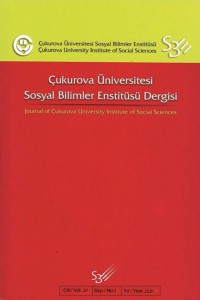Abstract
Mali devalüasyon, işveren sosyal güvenlik primlerindeki indirimin eşanlı olarak katma değer vergisi (KDV) oranındaki bir artışla telafi edildiği geleneksel olmayan bir maliye politikası uygulamasıdır. Mali devalüasyon kuramı oldukça zarif bir yapıya ve işleyiş mekanizmasına sahip olmasına rağmen bazı uygulamaya yönelik sorunları cevapsız bırakmaktadır. Zira kuramın önerdiği şekliye uygulanan mali devalüasyonun rekabetçi mali devalüasyona neden olup olmayacağı, kısa ve uzun dönemde nasıl etkiler yaratacağı ve bu etkilerin kalıcı veya geçiçi mi olacağı, uygulanacak ülkenin yapısal şartlarınının nasıl olması gerektiği ve son olarak uygulamadaki başarı için hangi koşullara dikkat edilmesi gerektiğine dair açık veya bütüncül bir cevap yoktur. Bu nedenle çalışmada bu sorular ve sorunların nasıl giderilmesi gerektiğine dair araştırma sonuçları sunalacaktır.
References
- Akça, H. ve Bozatlı, O. (2019). Avrupa Birliği’nde Alternatif Maliye Politikası: Mali Devalüasyon. Eurasian Academy of Sciences Eurasian Business & Economics Journal. 17 (1), 72-84.Arnold, J. (2008). “Do Tax Structures Affect Aggregate Economic Growth ? : Empirical Evidence From a Panel of OECD Countries”, OECD Economics Department Working Papers, No. 643, OECD Publishing, Paris.Arpaia, A., & Carone, G. (2004). Do Labour Taxes (and their composition) Affect Wages in the Short And The Long Run? Available at SSRN 871040.Bernoth, K., Burauel, P., & Engler, P. (2014). Fiscal Devaluation: Economic Stimulus for Crisis Countries in the Euro Area. DIW Economic Bulletin, 4(10), 12-18.Blanchard, O., Dell’Ariccia, G., & Mauro, P. (2010). Rethinking Macroeconomic Policy. Journal of Money, Credit and Banking, 42, 199-215.Bosca, J. E., Domenech, R., & Ferri, J. (2013). Fiscal Devaluations in EMU. Hacienda Pública Española/Review of Public Economics, 206(3), 2013.Burgert, M., & Roeger, W. (2014). Fiscal Devaluation: Efficiency and Equity (No. 542). Directorate General Economic and Financial Affairs (DG ECFIN), European Commission.Ciżkowicz, P., Radzikowski, B., Rzońca, A., & Wojciechowski, W. (2017). Fiscal Devaluation and Economic Activity in the EU. Narodowy Bank Polski. Education & Publishing Department.Coenen, G., McAdam, P., & Straub, R. (2008a). Tax Reform and Labour-Market Performance in the Euro Area: A Simulation-Based Analysis Using The New Area-Wide Model. Journal of economic Dynamics and control, 32(8), 2543-2583.Coenen, G., Mohr, M., & Straub, R. (2008b). Fiscal Consolidation İn The Euro Area: Long-run Benefits and Short-Run Costs. Economic Modelling, 25(5), 912-932.De Mooij, R. and Keen, M. (2012a). Fiscal Devaluation and Fiscal Consolidation: The VAT in Troubled Times (No. 12-85). International Monetary Fund.De Mooij, R. and Keen, M. (2012b). Fiscal Devaluation As A Cure For Eurozone İlls – Could it work? https://voxeu.org/article/fiscal-devaluation-cure-eurozone-ills-could-it-work. Erişim Tarihi: 30.05.2018.Engler, P., G. Gannelli, J. Tervala, and S. Voigts (2014) Fiscal Devaluation in a Monetary Union. IMF Working Paper Series 201.European Commission (2013). Tax reforms in EU Member States 2013- Tax policy challenges for economic growth and fiscal sustainability. European Economy 5, October 2013, Brussels: European Commission, DG ECFIN and DG TAXUD.Ghironi, F. and Weigert, B. (2018). Germany Did Not Pursue Fiscal Devaluation. In Explaining Germany’s Exceptional Recovery (pp. 77-89). CEPR Press.Holzner, M., Tkalec, M., & Vukšić, G. (2019). Composition of Trade Flows and The Effectiveness of Fiscal Devaluation. The World Economy, 42(2), 453-477.IMF (2011). Fiscal Monitor: Addressing Fiscal Challenges to Reduce Economic Risks. International Monetary Fund.IMF (2012). “Italy – Selected Issues”, IMF Country Report No. 12/168.Kıral, H., & Erden, L. (2018). Bilateral Trade Effects of Fiscal Devaluation: Evidence From OECD Countries. The Journal of International Trade & Economic Development, 27(6), 585-606.Koske, I. (2013). Fiscal Devaluation–Can it Help to Boost Competitiveness? (No. 1089). OECD Publishing.Langot, François; Patureau, Lise; Sopraseuth, Thepthida (2012). Optimal Fiscal Devaluation, IZA Discussion Papers, No. 6624, Institute for the Study of Labor (IZA), Bonn.Langot, F., Patureau, L., & Sopraseuth, T. (2014). Fiscal Devaluation and Structural Gaps. https://hal.archives-ouvertes.fr/hal-01438360/document Erişim Tarihi: 23.06.2019.Musgrave, R. A., Musgrave, P. B. (1989). Public Finance in Theory and Practice (Vol. 5). New York: McGraw-Hill.Nickell, S. (2003). Employment and Taxes. CESifo Working Paper, No. 1109, Center for Economic Studies and Ifo Institute (CESifo), Munich.Orsini, K., Burgert, M., Grevesmühl, O., & Suardi, M. (2014). Assessing The İmpact of a Revenue-Neutral Tax Shift Away From Labour İncome in Spain. Publications Office of the European Union.Pereira, A. M., Pereira, R. M., & Rodrigues, P. G. (2014). On The Long-Term Impact of a Fiscal Devaluation: An Application to the Portuguese Case (No. 116).Petersen, T. (2014). Fiscal Devaluation – A Route to More Growth? https://ged-project.de/wp-content/uploads/2015/06/Impulse-2015-04-Fiscal-devaluation-.pdf Erişim Tarihi: 17.06.2019.Poterba, J. M., Rotemberg, J. J., & Summers, L. H. (1986). A Tax-Based Test for Nominal Rigidities. The American Economic Review, 659-675.Prescott, E. C. (2004). Why do Americans Work So Much More Than Europeans? (No. w10316). National Bureau of Economic Research.Sastre, F., Rey-Maquieira, J., & Arbulú, I. (2017). The Euro Crisis, Fiscal Devaluation, and Impacts on the Tourism Sector in the Spanish Economy. Tourism Economics, 23(4), 816-833.Vdovychenko, A., & Zubritskiy, A. (2014). The Ukrainian Case of Fiscal Devaluation in Small Open Economies. https://mpra.ub.uni-muenchen.de/69329/1/MPRA_paper_69329.pdf Erişim Tarihi: 30.05.2018.
Details
| Primary Language | Turkish |
|---|---|
| Journal Section | Articles |
| Authors | |
| Publication Date | April 20, 2020 |
| Submission Date | September 24, 2019 |
| Published in Issue | Year 2020 Volume: 29 Issue: 1 |

